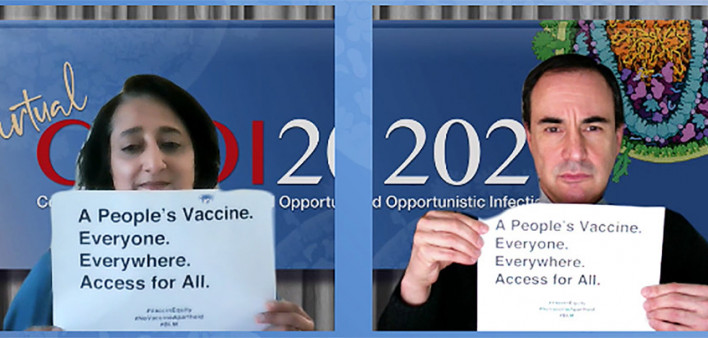A year ago, as the true scope of the COVID-19 pandemic dawned, the annual Conference on Retroviruses and Opportunistic Infections (CROI) quickly transformed into a virtual meeting.
A year ago today, I was packed and ready for a Sunday flight to an #HIV conference in Boston when I heard they decided to cancel at the last minute. That’s when #COVID19 got real for me. #CROI21 #CROI2021 https://t.co/03pgqoJGKk pic.twitter.com/L1IMz0JIlb
— Liz Highleyman (@LizHIVHep) March 7, 2021
As Sharon Hillier, PhD, of the University of Pittsburgh School of Medicine, recalled at this year’s opening plenary on March 7, a small number of COVID-19 cases had been reported at another conference that took place days before in Boston, where CROI was to be held. Ultimately, that outbreak would be tied to as many as 300,000 cases.
Last year’s CROI included a hastily planned session on the new coronavirus. A year later, more than half the invited talks and a quarter of accepted abstracts are related to COVID-19, and many HIV researchers and advocates have pivoted to focus on the new pandemic.

Sharon Hillier at CROI 2021 opening plenaryCROI 2021 screen shot
Fatima Hassan, of the Health Justice Initiative in Cape Town, and Gregg Gonsalves, PhD, of Yale School of Public Health, kicked off Sunday’s opening session with a discussion entitled "Vaccine Nationalism is Killing Us: How Inequities in Research and Access to SARS-CoV-2 Vaccines Will Perpetuate the Pandemic."
While the COVID-19 vaccine rollout is now proceeding speedily in the United States, the United Kingdom and Israel, the same can’t be said for the rest of the world—especially low- and middle-income countries.
“Only a small proportion of the planet will be vaccinated this year,” Gonsalves said. "It’s miraculous that we have very effective vaccines a year out. We have the tools we need to do this—it’s no longer a scientific problem, it’s a political crisis.
Recalling the global effort to roll out HIV treatment in the early 2000s, Hassan and Gonsalves called for a “people’s vaccine.”
A #PeoplesVaccine. #NOVaccineApartheid. #VaccinEquity. Thank you to #CROI2021 for making our discussion on #COVID19 vaccine nationalism the first up in the first plenary of this worldwide conference. Access for all. Now. pic.twitter.com/3y2KokHlTX
— Gregg Gonsalves (@gregggonsalves) March 7, 2021
UPDATE: You can watch the discussion here.
The COVAX initiative, led by the World Health Organization, GAVI and the Coalition for Epidemic Preparedness, aim is to accelerate the development and manufacture of COVID-19 vaccines and to guarantee fair and equitable access for every country in the world. So far, according to GAVI, COVAX has shipped more than 12 million vaccine doses to 19 countries, but much work remains to be done.
Also speaking at Sunday’s plenary, National Institutes of Allergy and Infectious Diseases director Anthony Fauci, MD—long a fixture at HIV conferences and now a world-renowned figure as the leading voice of the U.S. COVID-19 response—spoke about the similarities between the two pandemics.
Two commonalities, disparities and denialism, have hampered an effective global response to both diseases. But the emergence of alliances between scientists, policymakers and advocates has been a silver lining. Reminding listeners of the pressure from activists that spurred the development and deployment of effective treatments for HIV, Fauci noted that the same is happening for COVID-19 today.

From Anthony Fauci, MD, N’Galy-Mann lecture at CROI 2021CROI 2021 screenshot
“We listened to AIDS activists and we learned from them and things got better,” he said. "We created a new paradigm of community engagement that’s now being applied to COVID-19."
New related content:
Advocates Call for Global COVID-19 Vaccine Access
Sign on to a Call for Global Vaccine Equity here.
After Pushback, CROI Makes Some Materials Public
The CROI 2021 program guide and abstract ebook are available for free here.








Comments
Comments